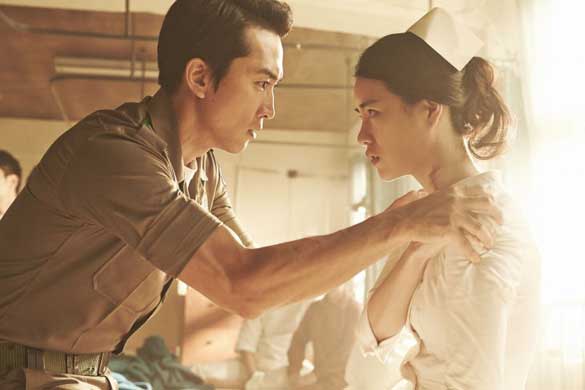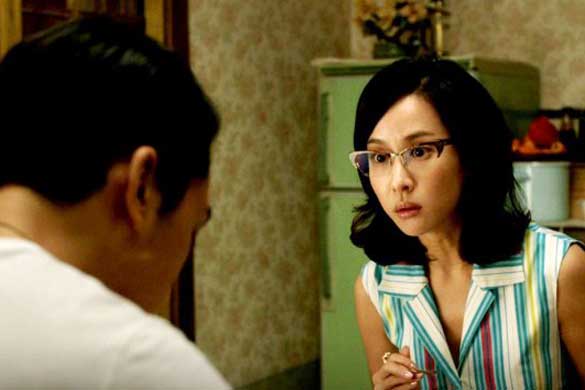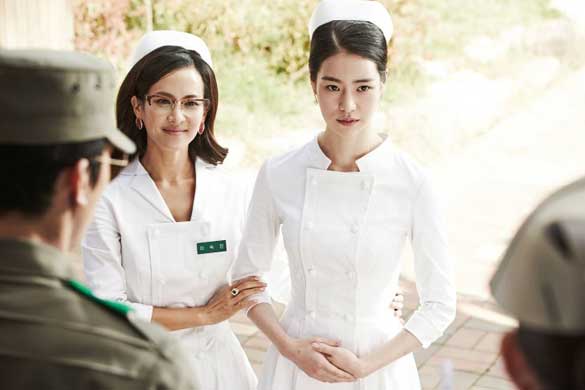"Not having you makes my heart ache like never before... I can't breathe.
You once said that you loved me and that life without me wasn't worth living. I need to know, do you still love me now?"
Synopsis:
Returning to Korea in 1969 after fighting in Vietnam, Kim Jin-peong (Song Seung-heon) takes up a position in charge of a military institution/hospital; his wife Sook-jin (Jo Yeo-jeong) being one of the head nurses at the facility. While from the outset he shows himself to be a fair and compassionate man and is quickly perceived by colleagues, subordinates and top military brass alike as a balanced individual, Jin-peong is in reality suffering greatly from post traumatic stress; nightmares and flashbacks to his time in battle increasingly infringing on his waking life and threatening a complete unhinging of his psyche.
However, unbalanced though he already is, Jin-peong finds his mind thrown into further turmoil when he injures the beautiful Ga-heun (Lim Ji-yeon), the wife of his new subordinate, while trying to protect her from a violent hospital patient and on visiting her - out of somewhat of a sense of guilt - while she recovers, he soon begins to fall head over heels in love with her.
Shy, retiring and feeling totally out of place in her surroundings, Ga-heun initially turns down Jin-peong's not so subtle advances leading him to the (increasingly alcohol fuelled) decision to make her his at all cost regardless of whether the price he must ultimately pay is the destruction of his career, his marriage or even his very life...
Review:
Those familiar with Kim Dae-woo's previous directorial work ('The Servant'; 'Forbidden Quest') will undoubtedly already be fully aware of the sumptuous visual beauty with which his films are imbued. Such is also the case in 'Obsessed' and though the setting of the film (the late 60s and early 70s, in the midst of the Vietnam War) is far more recent than the director's other Joseon era narratives it can equally be considered a period piece and while the use of the utterly stunning imagery is different in some respects - in both 'The Servant' and 'Forbidden Quest' cinematography and lavish sets serve to, among other things, underline a juxtaposition of the palace life of the upper echelons of Joseon society with the often difficult existence of the normal poor; while in 'Obsessed' the breadth of societal levels within the narrative's closed microcosm is, by its very nature, far less marked - they nonetheless accent the emotional content (and indeed emotions of the main characters) in a similar fashion to Kim Dae-woo's earlier films, and perfectly so.
While the societal aspects of 'Obsessed' are, as already stated, much less expansive than would be allowed by a classic Joseon era drama, the gorgeous visuals do add greatly to the depiction of the film's overall setting: From the outset, the entire facility, its surroundings and even its inhabitants (deliberately) are noticeably influenced by Westernised ideas, not to mention the appearance of a number of dialogue snippets pointing out that one appliance or another is American; the gossiping military wives repeatedly showing a preoccupation with clothes that remind them of US actresses and having their hair done in what could easily be mistaken for an American salon in the 60s (their love of Western trivialities and indulgences sitting in stark, noticeable contrast to their ostracising of Ga-heun, prior to any liaison with Jin-peong, simply because she is of Chinese descent and therefore not to be trusted as she's 'bound to have' communist leanings, from their point of view). As such, these narrative moments combine with the aforementioned visuals to repeatedly yet subtly point to the increasing influence America and indeed Western culture was having on Korea during, as well as before and after, the period in question.
However, while it could even be said that this willing acceptance of Western 'freedoms' plays at least a part in Ga-heun and Jin-peong's move towards adulterous actions just as traditionalism influences the ultimate outcome of proceedings, let's not forget that 'Obsessed' is not at its core a two-hour history lesson but is instead a story of the meeting of two souls society has deemed unsuitable to be together, and on that issue Kim Dae-woo also has something to say:
 |
From the very first scene in 'Obsessed' - showing a drinks party held in honour of Jin-peong's return to Korea; all involved lauding him as a war hero - it is clear that he stands at odds with every perception held about him by others. They see a heroic figure when all he remembers is pointless pain and needless death; they assume that the job he's about to begin suits him to a tee while he's so haunted by his experiences that all he wants is to find a means of escape; they ply him with alcohol when he's been told by doctors not to drink; and his family (and love) life is full to the brim with nothing but the utterly mundane when he's desperate for something, anything, to pour his heart and soul into.
Similarly, Ga-heun has had a painful past and like Jin-peong simply doesn't fit within her current situation and as such they stand as kindred spirits equally out of place and separate from those around them; virtually unable to refrain from connecting with each other, even if the invariable consequences of their actions are clear from any distance.
Kim Dae-woo (fairly deftly) takes his time in detailing each of the main characters' present situation in depth (almost exactly one hour of the film's running time passes before Ga-heun and Jin-peong's first sexual encounter takes place) allowing the passion between the two to build in tandem to an almost palpable level and serving to make their illicit affair both psychologically and physically 'explode' (more on this shortly) when it finally, inevitably arrives. However, to my mind, the one area that is detailed less than it should (importantly) be is the past pain of each of our two lovers:
While 'Obsessed' does feature a superb dream sequence in which Jin-peong is haunted by a recurring nightmare of staggering through dead bodies in Vietnam clutching a severed head - leading to a brief conversation with a doctor relating to his post traumatic stress - it is almost the only mention of his condition and though his increasing reliance on alcohol does underline his ongoing issues, outward references are subsequently largely avoided. Ga-heun past too is only spoken of briefly in passing - once in a conversation with Jin-peong and once in the gossip of the military wives - and again I feel that slightly more time spent in this area too would have spoken of the connection of these outsiders to a more noteworthy extent; rather than it being largely left for viewers to 'assume' the continuing importance of the characters' past pain to their current ongoing situation.
 |
Thankfully, once the love affair between Ga-heun and Jin-peong gets underway, physically, in earnest, it is so sensually and indeed erotically realised (to, again, a similar graphic and unabashed level to the sexual content in the director's earlier films) that the above misgivings can pretty much be pushed aside to little more than a postscript 'niggle' and utter investment in the ultimately poignant and tragic tryst is not detracted from in any way, shape or form.
I mentioned earlier the 'explosive' nature of Ga-heun and Jin-peong's sexual encounters and I did so in an almost literal sense, for in the second of their illicit sexual encounters Kim Dae-woo perfectly builds palpable sensuality, longing and sexual tension to the nth degree before visually and aurally creating a moment of sudden and absolute 'relief' as the two give in to their long-denied desires. The use of the term 'exploding' may be considered by many to be hyperbole on my part but trust me when I say that when you watch the scene in question you'll know exactly what I mean.
Considering how strong the majority of 'Obsessed' is, and how perfectly slow-burning and brooding it succeeds in being, the culmination of the overall tale sadly forms the weakest element of the film as a whole. It pretty much goes without saying that the narrative long points towards an eventual move to melodrama (this is a Korean romance, after all) but while for a time it seems that the ultimate character arcs will be not only touching and poignant but also wholly believable, Kim Dae-woo sadly takes the decision to mount 'final' melodramatic moment on top of final melodramatic moment making it difficult for me, for one, not to roll my eyes in incredulity. Fear of spoilers precludes me from going into specifics here but were it not for this issue the ultimate outcome of 'Obsessed' would have successfully resounded and stayed with viewers; easily standing as an utterly classic ending to an archetypal poignant Korean romance (having a great deal in common with the post-war elements of 'The Classic', for example) but as a result of squeezing in too many heartaches and unrealistic close calls Kim Dae-woo succeeds in only detracting from the very tearjerker he was aiming to create.
As a final note, when I first became aware of 'Obsessed' and the fact that it was to star actress Jo Yeo-jeong, I instantly assumed that because of her previous, fairly graphically sexual, film roles ('The Servant'; 'The Concubine') that she would play ill-fated lover Ga-heun. On subsequently realising that Kim Dae-woo had instead chosen to give the role to newcomer Lim Ji-yeon I have to admit to being a tad disappointed. However, having watched the film a number of times I have come to realise that the director did indeed choose well:
Lim Ji-yeon as a fairly new face fits perfectly with Ga-heun's out of place persona and somehow comes across as more vulnerable than would likely have been the case if a well known star such as Jo Yeo-jeong had been cast, even if Jo Yeo-jeong's filmography shows her to be utterly adept at portraying femme fatales and able to deftly add palpable sensuality to graphic love scenes. The only downside to this is the fact that as a result Jo Yeo-jeong's role as Jin-peong's wife is little more than a supporting character role and though she gives an accomplished performance (as much as the part will allow) as a fan of her work I would ideally have liked her to have been given more scope.
 |
Update:
In response to this review, Jin-hee Cho (a lady with an in-depth knowledge of Korean cinema whose insightful, informative thoughts and opinions I greatly respect) rightly pointed out that for those Korean film fans who have yet to watch 'Obsessed' an acting chemistry between acting newcomer Lim Ji-yeon and veteran actor Song Seung-heon is rather difficult to envision; the success of a story such as this largely hinging on the credibility of the characters' interactions and ultimately the believability of their poignant love affair. As such, I felt it would be worth discussing that subject here as an update/addendum, in the hope of making the review as rounded as possible:
With 'Obsessed' being Lim Ji-yeon's first feature film role, one can only imagine the pressure she faced in being paired with a hugely famous and respected actor like Song Seung-heon (with the inherent character chemistry their interactions required) and in fact playing a part with far more importance than that of well known actress Jo Yeo-jeong - who played the largely supporting role of Jin-peong's wife - but whether or not Lim Ji-yeon was fully aware of the huge task with which she was charged, director Kim Dae-woo wisely makes an out-of-depth and out-of-place element part and parcel of the character of Ga-heun; not only circumventing the possibility of any such 'pressured' issue but also increasing believability by imbuing Ga-heun's very personality with shyness, vulnerability and noticeably reserved, almost frightened, quality. Not only that, but Kim Dae-woo makes a point of implying that those very traits are the result of Ga-heun's past resulting in relevance and connection within the overall narrative. Finally, the majority of the most nuanced emotional content is wisely left to Song Seung-heon to portray with Lim Ji-yeon given the somewhat easier job of, on the whole, reacting to it rather than initiating.
That said, her performance in doing so is worthy of an actress with far more experience and the heartfelt emotion she successfully portrays (especially at the film's culmination) is both noteworthy and memorable on its own merits. In hindsight, in thinking about 'Obsessed' overall, I really didn't have any particular issue with the performances from any of the cast and if it had been wholly down to them the success of the melodramatic realisation of 'Obsessed' would, to my mind, have easily been achieved. As stated earlier in this review, my largest issue with the film's overall credibility was in the narrative's 'final' melodramatic moment being heaped on final melodramatic moment, which in my opinion was a directorial decision likely taken in an effort to make the film's conclusion somewhat different than the ending of the aforementioned 'The Classic', and the like. Sadly, that move undermines the ultimate believability of 'Obsessed' far more than any other element or indeed cast member portrayal.
Cast:
Song Seung-heon, Lim Ji-yeon, Jo Yeo-jeong, Yoo Hee-jin, On Joo-wan
Summary:
'Obsessed' for the most part succeeds in being a sensual, brooding and beautifully slow-burning tale of forbidden, illicit love but while director Kim Dae-woo's expertise in depicting palpably erotically-charged narratives serves as one of the film's many strong points his decision to ultimately pile 'final' melodramatic moment on top of final melodramatic moment is easily its weakest.
'Obsessed' (인간중독) / 2014 / directed by Kim Dae-woo
|





